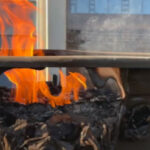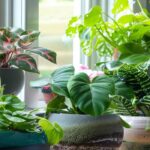Houseplant Jargon: Do You Pot Up in Your Indoor Garden?
If you talk to your houseplants like I do and family or friends overhear, they might be a little concerned. Not just about the fact that you’re talking to plants, but what you’re saying. A typical conversation with my houseplants goes something like this:
“Hey there, little green guy. You ready to get all potted up? I know you’ll feel a lot better.”
[Me listening for a response].“Great! Glad you’re so eager! That’ll make the process go much easier. Good thing we pre-hydrated you prior.”
[Me listening for a response].“What’s that? You also want to do a little deadheading? Superb idea, little green guy!”
Like any hobby, indoor gardening has its own terminology. So the next time someone overhears you and looks alarmed, just give them this houseplant garden jargon “cheat sheet.”
Amendment:
Yes, it is a constitutional proceeding, but this term also refers to organic materials that you add to your potting soil to make it a super healthy place for your houseplants to set down roots. Such additions include worm compost, peat moss and pumice.
Bolt:
You might feel like doing this when you’re chatty neighbor visits, but it also refers to what happens when you grow vegetables indoors and they stop producing. Instead of new foliage, the plants will create flower stalks. This is especially a problem with lettuce and herbs. The remaining foliage also turns bitter.
Cross:
In relationships, this is how you feel when your significant other leaves the toilet seat up in the middle of the night. When it comes to indoor gardening, this is what occurs when two parent houseplants with dissimilar parents cross and make a whole new super cool plant.
Cultivate:
This term may sound a little “stuck up,” but with houseplants it simply means to dig in the potting soil in your containers to prepare the soil for planting.
Dead-head:
No, we’re not talking wild concerts—although that sounds really fun for you and your houseplants. Deadheading in your indoor garden means to remove flowers that have finished so that the plant initiates new blooms.
Drainage:
This might come from your sinuses, but it also refers to the really important fact that houseplants generally need excellent drainage. Water should easily run through a pot and out the bottom when you hydrate your plants.
Established:
This is what occurs when a houseplant you’ve repotted gets acclimated to its new pot. You’ll know the houseplant is established when it puts on new growth. At that point, you can begin fertilizing. Avoid feeding plants prior to them becoming established.
Foliar feeding:
No, this isn’t what you do when your kids need to eat more veggies. This refers to spraying a liquid fertilizer onto plant leaves. The foliage absorbs the nutrients more quickly this way than through the roots. It’s a great option for nutrient-starved houseplants.
Hydrated:
This is when you can hear your houseplant sigh with relief as you water following a dry spell. On a well-hydrated plant, leaves are buoyant and full of moisture.
Leach:
This isn’t the cousin who’s always borrowing money. Houseplant leaching refers to running water through the plant pot to rid the soil of unhealthy elements like salt and fertilizer build up. This is a really good idea when you bring a new plant home. Follow leaching with a good fertilizing.
Pinch back:
Don’t get any nasty ideas. This term simply means to nip off shoots on plants to stimulate side branching and growth. Pinching creates a fuller, bushier plant. It’s a good idea to pinch back indoor grown herbs so they don’t bolt (see above for that definition!)
Potting up:
This might sound like an activity that’s against the law in some states, but it actually refers to repotting your houseplants—AKA, changing their “digs.”
Set down roots:
Yes, this is what happens when you settle down in a particular geographic area. A similar sort of thing happens when houseplant roots settle into healthy soil when you repot them.
Sucker:
P.T. Barnum was so right—suckers are born every minute, and sometimes it’s in your houseplant. Suckers are sprouts that come from the rootstock of plants—so below the grafted part of the plant. Remove suckers at their base as soon as you see them, because they suck energy from the plant. They’re common when you grow fruit trees indoors.
Transpiration:
You know when you sweat? Well, houseplants transpire.
And there you have it. Your lingo explained for the rest of the world. As to how you’ll explain the talking to your houseplants….let me know how that works out!





